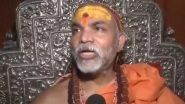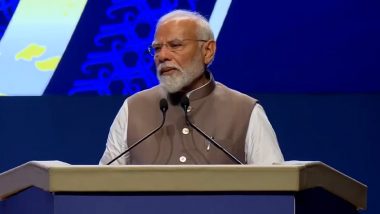Mumbai, June 5: The aftermath of Lok Sabha Election Results in India initiates a meticulously orchestrated government formation process, pivotal for the continuity of democratic governance in the nation. This procedural journey, from the Prime Minister's resignation to the dissolution of the Lok Sabha, encapsulates the essence of constitutional norms and parliamentary practices. Understanding this process sheds light on the intricacies of power transition and the democratic ethos that underpins India's political landscape.
Following the announcement of the Lok Sabha Election 2024 results on June 4, the BJP-led NDA is set to form a government for a third consecutive term. The NDA coalition won with a comfortable majority of 293 seats, while the opposition coalition, the Congress-led INDIA Bloc, managed to secure 232 seats of the 543 seats. As the meetings of both the NDA and INDIA Bloc are set to begin today, let's delve into the intricate steps involved in the formation of a new government in India. Uttar Pradesh Lok Sabha Elections Results 2024: How Samajwadi Party and Congress Turned Into Game Changers in UP.
How Is a New Government Formed in India?
Firstly, upon the declaration of the election results, the Prime Minister tenders his resignation to the President of India, initiating the dissolution of the previous government. Subsequently, the President invites the leader of the party or coalition with the majority of seats in the Lok Sabha to form the new government. The leader is then appointed as the Prime Minister-designate. The Prime Minister-designate selects ministers for the cabinet and other key positions. These selections are often strategic, balancing regional representation, expertise, and political alliances. Lok Sabha Election Results 2024: Let's Take a Look at Key Wins, Notable Losses in General Polls.
Once the cabinet is formed, the president swears in the Prime Minister-designate and the council of ministers. This marks the official beginning of the new government's term. Following the swearing-in, the government outlines its policies and programs in the President's address to the joint session of Parliament. This address sets the agenda for the government's term and highlights its priorities. The newly formed government must then prove its majority in the Lok Sabha through a floor test. This ensures that the government has the support of the majority of the members of the lower house of Parliament.
Throughout this process, the President acts as the constitutional head, guiding the formation of the new government in accordance with the provisions of the Indian Constitution. The formation of a new government in India after the Lok Sabha Election results involves a series of constitutional procedures aimed at ensuring stability, representation, and effective governance.
(The above story first appeared on LatestLY on Jun 05, 2024 12:36 PM IST. For more news and updates on politics, world, sports, entertainment and lifestyle, log on to our website latestly.com).













 Quickly
Quickly


